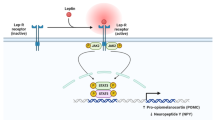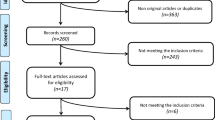Abstract
Objectives
Ramadan intermittent fasting may affect whole-body metabolism by affecting appetite-related hormones. This systematic review and meta-analysis aimed to clarify the possible effects of Ramadan intermittent fasting on the main hormones regulating appetite and satiety, including leptin and adiponectin.
Methods
All English language papers in the PubMed, Scopus, and Embase databases were searched using the keywords “Ramadan fasting”, “adiponectin”, and “leptin”, up to 2020. Data extraction was conducted based on the main data of the studies; the primary outcomes of the analysis were mean changes of adiponectin and leptin levels during the holy month of Ramadan in fasted subjects.
Main results
Data of 16 eligible studies, conducted between 2003 and 2020, were included in the systematic review. Of these, 10 studies with complete data on leptin and adiponectin were included in the meta-analysis. A significant decrease in leptin levels was observed after Ramadan fasting (WMD = −2.28 ng/ml, 95% CI = −3.72, −0.84). Ramadan fasting had no significant effect on adiponectin levels (WMD = 2.19 ng/ml, 95% CI = −0.29, 4.67). Sub-group analysis demonstrated a greater decrease in leptin levels among normal-weight subjects compared to those of overweight/obese subjects (WMD = −4.67 ng/ml, 95% CI = −6.03, −3.31 vs. WMD = −3.43 ng/ml, 95% CI = −5.69, −1.17).
Conclusion
Ramadan fasting may decrease leptin levels, especially in normal-weight subjects. There was high heterogeneity, which may be explained by the differences between the wide ranges of study conditions.



Similar content being viewed by others
Data availability
Not applicable
References
Khalil AB et al (2018) Research and ramadan fasting: not too much of a good thing! Ibnosina J Med Biomed Sci 10(2):35
Trepanowski JF, Bloomer RJ (2010) The impact of religious fasting on human health. Nutr J 9:57
IslamiCity. Islamic legal rules of fasting. 2017 [cited 2018 26 May ]; Available from: http://www.islamicity.org/5331/islamic-legal-rules-of-fasting/.
Bazzano AN, Potts KS, Mulugeta A (2018) How do pregnant and lactating women, and young children, experience religious food restriction at the community level? A qualitative study of fasting traditions and feeding behaviors in four regions of Ethiopia. PLoS One 13(12):e0208408–e0208408
Azizi F (2010) Islamic fasting and health. Ann Nutr Metab 56(4):273–282
Beshyah S et al (2018) The year in ramadan fasting research (2017): a narrative review. Ibnosina J Med Biomed Sci 10(2):39–53
Moher D et al (2015) Preferred reporting items for systematic review and meta-analysis protocols (PRISMA-P) 2015 statement. Syst Rev 4(1):1
Shea SA et al (2005) Independent circadian and sleep/wake regulation of adipokines and glucose in humans. J Clin Endocrinol Metab 90(5):2537–2544
Xie L et al (2008) Adiponectin and leptin are secreted through distinct trafficking pathways in adipocytes. Biochim Biophys Acta 1782(2):99–108
Lee B, Shao J (2014) Adiponectin and energy homeostasis. Rev Endocr Metab Disord 15(2):149–156
Nigro E et al (2014) New insight into adiponectin role in obesity and obesity-related diseases. Biomed Res Int 2014:658913–658913
Rosenbaum M, Leibel RL (2014) 20 years of leptin: role of leptin in energy homeostasis in humans. J Endocrinol 223(1):T83–T96
Trayhurn P, Bing C (2006) Appetite and energy balance signals from adipocytes. Philosophical transactions of the Royal Society of London. Series B, Biol Sci 361(1471):1237–1249
Ajabnoor GM et al (2014) Health impact of fasting in Saudi Arabia during Ramadan: association with disturbed circadian rhythm and metabolic and sleeping patterns. PLoS One 9(5):e96500
Alzoghaibi MA et al (2014) Diurnal intermittent fasting during Ramadan: the effects on leptin and ghrelin levels. PLoS One 9(3):e92214–e92214
Bogdan A, Bouchareb B, Touitou Y (2005) Response of circulating leptin to Ramadan daytime fasting: a circadian study. Br J Nutr 93(4):515–518
Bouhlel E et al (2008) Ramadan fastings effect on plasma leptin, adiponectin concentrations, and body composition in trained young men. Int J Sport Nutr Exerc Metab 18(6):617–627
Faris MAE et al (2019) Effect of Ramadan diurnal fasting on visceral adiposity and serum adipokines in overweight and obese individuals. Diabetes Res Clin Pract 153:166–175
Feizollahzadeh S et al (2014) Augmented plasma adiponectin after prolonged fasting during ramadan in men. Health Promot Perspect 4(1):77–81
Gnanou JV et al (2015) Effects of Ramadan fasting on glucose homeostasis and adiponectin levels in healthy adult males. J Diabetes Metab Disord 14:55
Kassab S et al (2004) Interactions between leptin, neuropeptide-Y and insulin with chronic diurnal fasting during Ramadan. Ann Saudi Med 24(5):345–349
Kassab SE et al (2003) Serum leptin and insulin levels during chronic diurnal fasting. Asia Pac J Clin Nutr 12(4):483–487
Khafaji HA et al (2012) The impact of diurnal fasting during Ramadan on the lipid profile, hs-CRP, and serum leptin in stable cardiac patients. Vasc Health Risk Manag 8:7–14
Khoshdel A et al (2014) The effect of Ramadan fasting on serum leptin, neuropeptide Y and insulin in pregnant women. Med J Islam Repub Iran 28:92
Kiyak Caglayan E et al (2016) The effects of prolonged fasting on the levels of adiponectin, leptin, apelin, and omentin in pregnant women. J Obstet Gynaecol 36(4):555–558
Mushtaq R et al (2019) The role of inflammatory markers following Ramadan Fasting. Pak J Med Sci 35(1):77–81
Reiches MW et al (2014) Endocrine responses, weight change, and energy sparing mechanisms during Ramadan among Gambian adolescent women. Am J Hum Biol 26(3):395–400
Telci Caklili O et al (2017) Differences in leptin, ghrelin, and glucagon-like peptide-1 levels between religious fasting and normal fasting. Turk J Med Sci 47(4):1152–1156
Vardarli MC, Hammes HP, Vardarli I (2014) Possible metabolic impact of Ramadan fasting in healthy men. Turk J Med Sci 44(6):1010–1020
Higgins JP, Thompson SG, Deeks JJ, Altman DG (2003) Measuring inconsistency in meta-analyses. BMJ Br Med J 327:557–560
Institute, J.B (2016) Checklist for quasi-experimental studies (non-randomized experimental studies). The Joanna Briggs Institute Critical Appraisal tools for use in JBI Systematic Reviews
Prinz P (2004) Sleep, appetite, and obesity—what is the link? PLoS Med 1(3):e61–e61
Guven S et al (1999) Plasma leptin and insulin levels in weight-reduced obese women with normal body mass index: relationships with body composition and insulin. Diabetes 48(2):347–352
Mars M et al (2005) Decreases in fasting leptin and insulin concentrations after acute energy restriction and subsequent compensation in food intake. Am J Clin Nutr 81(3):570–577
Fogteloo AJ et al (2004) Impact of meal timing and frequency on the twenty-four-hour leptin rhythm. Horm Res 62(2):71–78
Elimam A, Marcus C (2002) Meal timing, fasting and glucocorticoids interplay in serum leptin concentrations and diurnal profile. Eur J Endocrinol 147(2):181–188
Schrauwen P et al (1997) Effect of diet composition on leptin concentration in lean subjects. Metabolism 46(4):420–424
Raben A, Astrup A (2000) Leptin is influenced both by predisposition to obesity and diet composition. Int J Obes Relat Metab Disord 24(4):450–459
Khaled BM, Belbraouet S (2009) Effect of Ramadan fasting on anthropometric parameters and food consumption in 276 type 2 diabetic obese women. Int J Diab Dev Count 29(2):62–68
Shadman Z et al (2014) Ramadan major dietary patterns. Iran Red Crescent Med J 16(9):e16801–e16801
Turin TC et al (2016) Ramadan fasting is not usually associated with the risk of cardiovascular events: a systematic review and meta-analysis. J Fam Community Med 23(2):73–81
Bahammam A (2007) Does Ramadan fasting affect sleep? Int J Clin Pract 60:1631–1637
Morselli L et al (2010) Role of sleep duration in the regulation of glucose metabolism and appetite. Best practice & research. Clin Endocrinol Metab 24(5):687–702
Van Cauter E et al (1991) Modulation of glucose regulation and insulin secretion by circadian rhythmicity and sleep. J Clin Invest 88(3):934–942
Motivala SJ et al (2009) Nocturnal levels of ghrelin and leptin and sleep in chronic insomnia. Psychoneuroendocrinology 34(4):540–545
Taheri S et al (2004) Short sleep duration is associated with reduced leptin, elevated ghrelin, and increased body mass index. PLoS Med 1(3):e62
Figueiro MG, Plitnick B, Rea MS (2012) Light modulates leptin and ghrelin in sleep-restricted adults. Int J Endocrinol 2012:530726–530726
Gavrila A et al (2003) Serum adiponectin levels are inversely associated with overall and central fat distribution but are not directly regulated by acute fasting or leptin administration in humans: cross-sectional and interventional studies. J Clin Endocrinol Metab 88(10):4823–4831
Lihn AS, Pedersen SB, Richelsen B (2005) Adiponectin: action, regulation and association to insulin sensitivity. Obes Rev 6(1):13–21
Cho Y et al (2019) The effectiveness of intermittent fasting to reduce body mass index and glucose metabolism: a systematic review and meta-analysis. J Clin Med 8(10):1645
Patterson RE et al (2015) Intermittent fasting and human metabolic health. J Acad Nutr Diet 115(8):1203–1212
Ganesan K, Habboush Y, Sultan S (2018) Intermittent fasting: the choice for a healthier lifestyle. Cureus 10(7):e2947–e2947
Stockman M-C et al (2018) Intermittent fasting: is the wait worth the weight? Curr Obes Rep 7(2):172–185
Acknowledgements
This study was supported by the Research Institute for Endocrine Sciences, Shahid Beheshti University of Medical Sciences.
Code availability
Not applicable
Funding
This work was not supported by any funding agency.
Author information
Authors and Affiliations
Contributions
ZG designed the study. ZB and PM collected data from studies, ZG and PM reviewed the studies and wrote the manuscript, and ZG and ZB corrected the manuscript. All authors read and approved the final manuscript.
Corresponding authors
Ethics declarations
Ethics approval and consent to participate
The study protocol was approved by the ethics research council of the Research Institute for Endocrine Science, Shahid Beheshti University of Medical Science in Tehran.
Consent for publication
Not applicable
Competing interests
The authors declare no competing interests.
Additional information
Publisher’s note
Springer Nature remains neutral with regard to jurisdictional claims in published maps and institutional affiliations.
Supplementary Information
ESM 1
(DOCX 14 kb)
Rights and permissions
About this article
Cite this article
Gaeini, Z., Mirmiran, P. & Bahadoran, Z. Effects of Ramadan intermittent fasting on leptin and adiponectin: a systematic review and meta-analysis. Hormones 20, 237–246 (2021). https://doi.org/10.1007/s42000-021-00285-3
Received:
Accepted:
Published:
Issue Date:
DOI: https://doi.org/10.1007/s42000-021-00285-3




